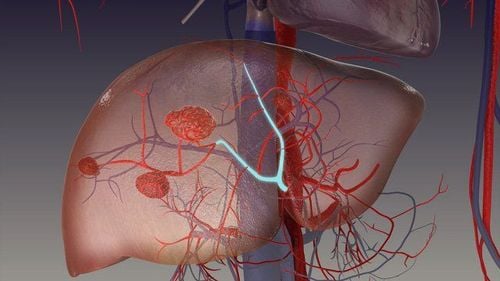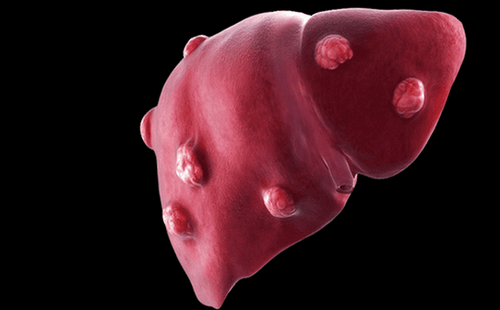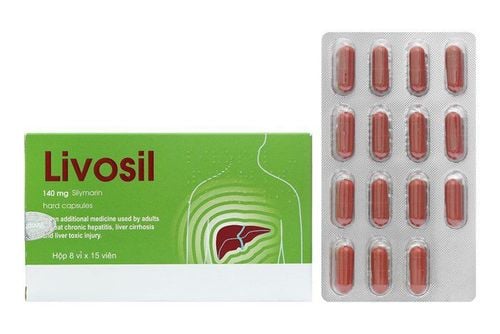This is an automatically translated article.
Liver tumors are the first and most common manifestation of liver cancer. However, liver tumors can also be benign and cause almost no complications. So, how to distinguish these two types of liver tumors and how to treat each type?1. How to know if a liver tumor is liver cancer?
Liver tumors are of two types, malignant liver tumors and benign liver tumors. Malignant liver tumor, also known as primary liver cancer (meaning a malignant tumor that arises from liver cells). The main cause is that patients are infected with hepatitis B and C viruses and have a habit of drinking alcohol, leading to cirrhosis and eventually liver cancer (80% rate). In addition, there are cases of congenital, slow-growing liver cancer. Besides, when there are many tumors growing in the liver at the same time, it is called multifocal liver cancer.To diagnose primary liver cancer, doctors must rely on characteristic clinical symptoms, such as abdominal pain in the liver area, weakness, fatigue, jaundice and loss of appetite, sometimes spontaneously. There is a large tumor in the right lower quadrant. The necessary paraclinical information to diagnose liver cancer includes: Blood test, liver function test, ultrasound, CT scan, Alpha Fetoprotein blood test,... Some cases A biopsy of the tumor is required for the histopathological diagnosis.
Benign liver tumors include hemangiomas, hepatocellular adenomas, syphilis and liver cysts. Benign liver tumors are often discovered incidentally during visits to other medical conditions and diagnostic ultrasounds. Most cases of benign liver tumors progress quite slowly and cause almost no complications. Therefore, basically, this type of liver tumor does not need to be treated, but it is necessary to monitor and intervene when there are complications of cyst rupture, bleeding in the tumor,...
When detecting signs of liver tumor such as: loss of appetite, fatigue, weight loss, unusual abdominal pain, feeling of tightness, heaviness in the right lower quadrant, the patient needs to go to a medical facility for examination. If it is concluded that the liver tumor is benign, you can rest assured. However, healthy people should also go for regular check-ups every six months or when they notice abnormal signs in their body so that they can promptly screen for tumors and cancer germs.
Trắc nghiệm: Làm thế nào để bảo vệ lá gan khỏe mạnh?
Làm test trắc nghiệm kiểm tra hiểu biết về gan có thể giúp bạn nhận thức rõ vai trò quan trọng của gan, từ đó có các biện pháp bảo vệ gan để phòng ngừa bệnh tật.2. Are liver hemangiomas and liver cancer the same?
Many patients, when diagnosed by a doctor as "having a hemangioma in the liver", feel fear and confusion, not knowing if a liver hemangioma is a liver cancer. The network of blood vessels in or on the liver's surface is tangled. This is considered a benign tumor in the liver, almost causing no symptoms and there is no evidence that liver hemangiomas will progress to liver cancer. It is estimated that for about every 100 healthy people, about 5-7 people develop hemangiomas in the liver. Liver hemangiomas can have the form of a mass or multiple masses. Tumors are usually small and cause no symptoms. However, in some cases the tumor can still grow large. For patients with large hemangiomas in the liver, some symptoms may appear such as abdominal pain or vomiting. In general, hemangiomas in the liver rarely cause complications. However, for pregnant women who are using hormone therapy (including birth control pills) or have liver disease, there is a risk of complications:Liver damage. Widespread hemangioma. Unusual pain. In case a blood tumor in the liver leads to complications, the patient should be treated with a doctor to promptly handle and prevent dangerous situations.
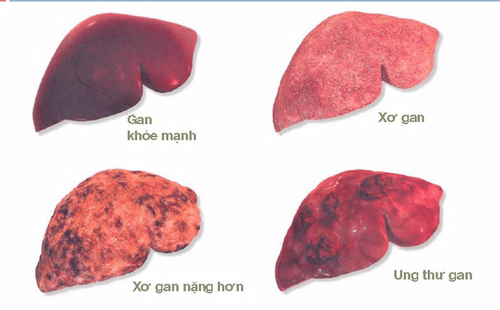
Xơ gan dẫn tới ung thư gan
3. Treatment of malignant liver tumors
For liver cancer caused by malignant liver tumors, surgery to remove part of the liver is still the main treatment aimed at prolonging the patient's life. However, surgery for liver cancer is only applied when the liver tumor is smaller than 5cm and has only a single lesion site.In case surgery is not possible, depending on the specific case, the doctor may consider choosing one of the following treatment methods:
Embolization combined with intravenous chemotherapy: A catheter is inserted into the tumor's feeding artery, injecting chemotherapy drugs to kill cancer cells, and injecting an oily substance that clogs the blood vessels of the cancer cells. This method is ideal for patients with a single tumor in the liver. As for the case of multifocal liver cancer, this method will not be suitable. Radiofrequency ablation: A very thin metal rod (called an electrode) is inserted through the skin into the liver. Then, the electrode is heated by high-frequency radio waves and burns the liver cancer cells. This method is also only preferred for patients with a single tumor in the liver. Systemic chemotherapy: When there has been a lot of damage in the liver or when liver cancer has spread to other organs such as bones, lungs, intra-abdominal nodes, etc., systemic treatments are used. would be the most appropriate choice. Chemotherapy with drugs that kill cells can kill cancer and reverse symptoms. However, due to their systemic effects, chemotherapy drugs also cause many significant side effects. Liver cancer or all types of cancer in general is still a difficult disease to cure. However, with today's advanced treatment methods, patients still have a good "quality of life" after detecting and treating the disease. It is important that the patient is detected early and the treatment should be conducted in time, so that the treatment effectiveness and survival prognosis are guaranteed.
4. Screening and early detection of liver cancer at Vinmec
Vinmec is the leading prestigious address in liver cancer screening with advantages such as:Patients are examined and consulted with a team of highly specialized and experienced doctors in the Oncology specialty. Comprehensive professional cooperation with domestic and international hospitals: Singapore, Japan, USA,... Comprehensive patient care and treatment, multi-specialty coordination towards individualizing each patient. Having a full range of specialized facilities for diagnosis and staging before treatment: Endoscopy, CT scan, PET-CT scan, MRI, histopathological diagnosis, gene-cell testing, .. There are a full range of mainstream cancer treatment methods: surgery, radiation therapy, chemotherapy, stem cell transplantation,...
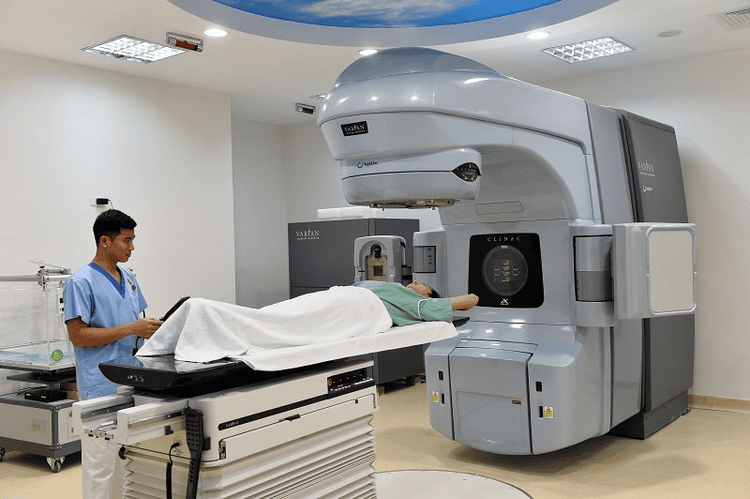
Vinmec đẩy lùi ung thư gan bằng công nghệ xạ trị siêu chuẩn
When registering for the Liver Cancer Screening and Early Detection Package, the patient will be directly examined by a specialist, tested for liver function assessment, screening for hepatitis B, hepatitis C and liver cancer. diagnostic imaging for malignant tumors. With a system of modern machinery and a team of highly qualified and experienced doctors, Vinmec is committed to the best protection for the health of patients.
Please dial HOTLINE for more information or register for an appointment HERE. Download MyVinmec app to make appointments faster and to manage your bookings easily.





